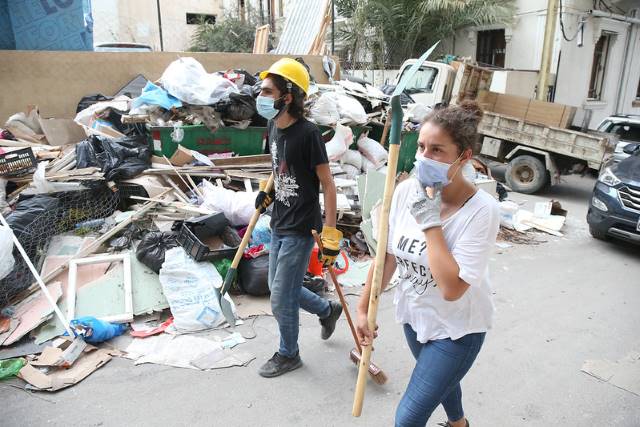Youth Mobilization After the Beirut Blast
 On August 4, 2020, a horrific explosion took place in Beirut, Lebanon, killing at least 214 people and injuring thousands of civilians. The Beirut blast “was one of the largest non-nuclear explosions in history” as it tore through the city. Estimations indicate that roughly “552 tonnes of ammonium nitrate exploded” at the port of Beirut. Since the explosion, Lebanon has experienced heightened civil unrest, economic hardship, increasing poverty and political deadlock.
On August 4, 2020, a horrific explosion took place in Beirut, Lebanon, killing at least 214 people and injuring thousands of civilians. The Beirut blast “was one of the largest non-nuclear explosions in history” as it tore through the city. Estimations indicate that roughly “552 tonnes of ammonium nitrate exploded” at the port of Beirut. Since the explosion, Lebanon has experienced heightened civil unrest, economic hardship, increasing poverty and political deadlock.
In the face of the tragedy and adversity that continues to plague Lebanon, young people in Beirut are innovatively working to rebuild the Lebanese capital. Cash 4 Work, a program mobilized by UNICEF, is a youth network focused on helping reconnect homes to municipal and private water supplies along with prioritizing the cleaning and rehabilitation of Beirut.
Economic Impacts of the Beirut Blast
Lebanon was facing a severe economic crisis even before the Beirut blast. After the explosion, poverty levels rose further and the Lebanese economy essentially collapsed. According to the World Bank, the country’s GDP has decreased by a staggering 40% with more than 50% of the population pushed into the depths of poverty. Job prospects for youth are increasingly difficult to come by, placing young professionals in a tough position as they attempt to secure their futures amid a failing economy.
Participants of the recent UNICEF Cash 4 Work program are primarily the most vulnerable and impoverished youth who understand first-hand what living in poverty looks and feels like. According to UNICEF, “Cash 4 Work programs create earning opportunities that can temporarily stabilize people’s incomes following a disaster or a crisis.” Participants learn valuable skills, knowledge and training to improve their economic status and their ability to provide for their families. Furthermore, with the tools to positively impact their country, youth participants are able to use their skills to rebuild the nation and lift others out poverty.
The Role of the Youth
Immediately after the explosion, the youth of Beirut were among the first to pick up the pieces and start rebuilding their communities. At the time, UNICEF staff were on the ground working with more than 1,170 youth volunteers to sweep up debris, perform household repairs and deliver food and cloth masks to affected citizens. In an interview with Forbes, a teenager working on the ground said, “We will not lose hope. We are staying here on the ground.”
UNICEF staff “reconnected more than 60 buildings to the public water system” and handed out emergency supplies “including 1,600 hygiene kits and 400 baby kits to families in need.” UNICEF also helped “reunite children with their families” and supported child counseling efforts to address the trauma of the Beirut blast.
Exactly one year after the Beirut blast, youth mobilization continues with the support of UNICEF’s new Cash 4 Work program, which ensures new job opportunities in Lebanon. Cash 4 Work is not only playing an active role in shaping the job market for young professionals but it is also connecting people with the goal of shaping a more positive future for Beirut. A 24-year-old Cash 4 Work participant, Mohammad, describes his experience with the program. He tells UNICEF, “I am happy that I gained a skill and I am still learning. To work on my future and achieve my goals, especially in these difficult times, is something special.”
Programs and initiatives from humanitarian organizations such as UNICEF bring hope to a devastated country, allowing citizens a chance to continue to rebuild and recover more than a year after the Beirut blast.
– Alysha Mohamed
Photo: Flickr
